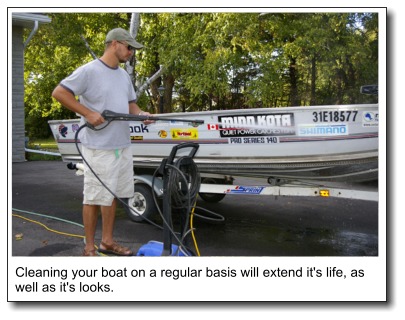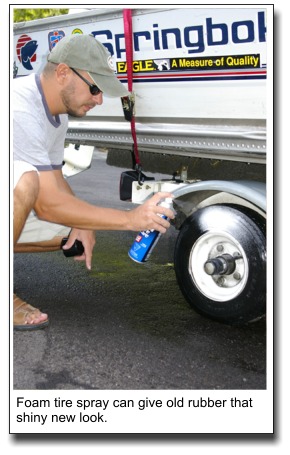 Boat
Cleaning 101 Boat
Cleaning 101By Justin Hoffman A fishing boat covets a great deal of pride and joy for its owner. Not only does it hold the greatest investment in this sport we enjoy, but it also becomes our “floating office” each time we step in and push away from the dock. Caring for and cleaning your boat not only adds value to your purchase by protection and restoration, but can also stop the spread of invasive species, which can be serious business. But, if you’re like me – a clean boat just gives you that happy feeling when out casting a line. Periodic cleanings from top to bottom will help keep your craft in tip-top shape – here is some advice to keep the job fun and simple.  Carpet CarpetThe carpet of your boat is prone to the most abuse possible. Not only do we drag our dirty feet on it, but also drip fish slime, spill salted plastics and scent, and of course, the odd beverage or two. Use a power washer or garden hose to spray down the entire carpeted surface, working from the bow to the stern. This will lift up the dirt and grime from the fibers. If stubborn stains persist, a deck brush worked over the area can remedy the problem. If you own a wet/dry vac, suctioning the dirt and water up can be done right away. If a conventional vacuum is to be used, allow the carpet to dry thoroughly before going to work on it. Livewells Your livewells can be a breeding ground for bad smells and even worse stains. Routinely cleaning these holding tanks will make for a better experience for the fish, as well as the owner. It is imperative when cleaning out livewells that a non-toxic product is used. Strong detergents, bleach or other chemicals can have a detrimental effect on the fish you place in here, which can come full circle if you intend to eat your quarry. Before starting the process, remove the filter screens, both from the livewell and the intake. A blast of clean water will usually free these from any clogs or deposits. For the livewell interior, baking soda and water can work wonders for alleviating smells and cleaning those scum lines. I like to pour a few tablespoons in with hot water, while using a coarse scrubbing pad to work the bottom, sides and top. Flush out with clean water numerous times, ensuring that all residues and cleaning solution has passed through the system, before hitting the lake.  Bilges Bilges
The bilge area can certainly take the title for concealing some of the grimiest dirt, sludge and oil residue. A commercial bilge cleaner will allow you to get the bottom of the boat clean, without having to get your hands dirty. These specific cleaners will break down oil, gas, grease and sludge, while cleaning and deodorizing the area. They will not affect metals, plastics or paint, so are very safe to use. The dirty water or residue can then be pumped out through your bilge, or sucked up with the use of a wet vac. Consoles When dealing with plastic and glass in and around the console area, an all-purpose spray cleaner, or “Windex” will do the trick. I like to use a partially wet, soft sponge for the initial rub down, and then finish the job with a dry cloth. For graphs or electronic gauges, a water-vinegar solution used in conjunction with a soft cloth will keep them fresh and clean. Wiping in a circular motion on electronic screens can leave grit marks or fine scratches, so pay close attention to work the cloth in one side-to-side direction only. Vinyl Vinyl seats can break down from exposure to the sun’s UV rays, leading to cracking and discoloration. Vinyl cleaners with added protectents will deep clean seat material, while also providing a “sunscreen” residue to help in further protection. Mildew stains can appear when material is not allowed to dry thoroughly or breathe. Dish soap, hot water and a hand-held deck brush can clear up this problem. Once dry, a mildew preventative spray should be applied to lessen the chances of reoccurrence. The Hull The hull of your boat takes on a lot of abuse, mostly from the sun and water. Stains and discolorations are a fact of life for anglers, but can be remedied with a few simple steps. Not only will your boat look like a million bucks after a good wash, it will also improve its handling performance and fuel efficiency. (Bonus points to consider with today’s high cost of gasoline.) Regardless of the type of coating your boat has, a thorough cleaning is the first step. Working a power washer over the entire hull, paying close attention to every nook and cranny, will clean away surface dirt while preparing the hull. While the boat is still wet, a commercial boat cleaner should be applied with a sponge or soft scrub brush. There are a myriad of products on the market for this purpose, but any that are specifically designed for boats and of a good quality should do. Rinse cleaner off with fresh water, and dry the hull with a soft cloth or towel. Gelcoats are applied to fiberglass boats to act as a protectent. UV rays from the sun can break down this layer, leading to oxidization. In order to prevent this, a wax or polish with a UV sunscreen should be applied after each cleaning. Choose a product that doesn’t contain harsh chemical or abrasive agents. Follow the manufacturer’s instructions when using a wax for the best possible finish. If your boat is of the painted aluminum kind, it can also benefit from the cleansing and waxing process. Outboard Engines Your engine can get grimy from oil residue and watermarks. Spray down the outside of the motor with the power washer or hose, then give it a good cleaning with a dish soap and brush. For tough spots, a commercial degreaser will get the job done. Spray on and use a soft bristled brush or coarse sponge. Thoroughly rinse the unit after using any detergents, and wipe dry with a soft towel.  Trailer TrailerYour boat trailer can get grimy from bugs, tar and dusty roads. Giving it a good cleaning when washing the boat will keep it looking sharp and brand new. Spray down all exterior surfaces with a high-pressured spray, paying special attention to wheel wells and bunks. A mild detergent, such as dish soap, can then be applied with a sponge or scrubbing pad. A good rinse and you’re good to go. The trailer tires and wheels should also be given attention. Scrub with a small brush or pad to clean away grease and dirt from the rims and sidewalls. Finish off the job by spraying a commercial tire shining foam to give the rubber that new and shiny look. Cleaning your boat should be a regular maintenance practice for any angler. By following these simple steps, your boat will still shine like the first day you laid eyes upon it…even if it is a few good years older.
|

